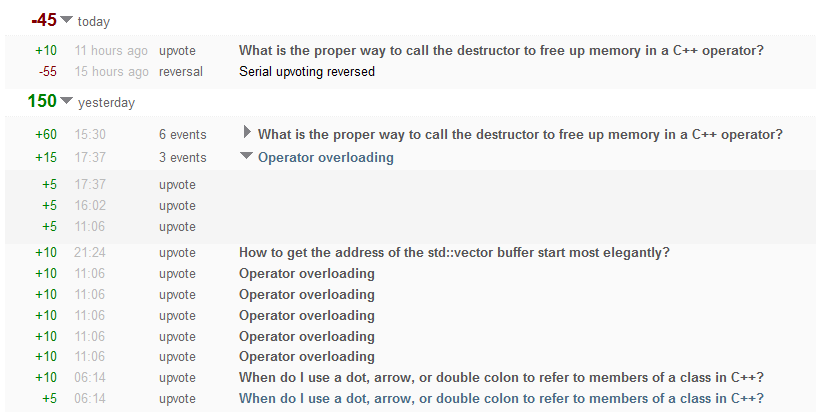Some time ago, I added an entry to the SO C++ FAQ community effort, which deals with C++ operator overloading. For that piece I had spent half a Sunday I was supposed to spend building something out of LEGO for my kids, plus I butchered an article draft that I had lying around which had accumulated more than a decade's worth of experience in C++. So I thought I'd deserve the rep I might get from it and didn't make this a community wiki question.
Over time, this has become one of the more popular FAQ entries. It got reddited, and sometimes I get a flurry of upvotes for it, supposedly because somebody must have linked to it from some other question. Also, operator overloading is one of the few topics on Stack Overflow I still cannot resist looking at questions about (I rarely answer anymore these days), and when I look at one of those questions, I usually consider it worth pointing out the FAQ in a comment. The other day I even provided an answer to such a question, in which I also put links to the relevant sections of that FAQ entry. This resulted in a few upvotes to the question and the answers.
Today, when I refreshed Stack Overflow's main page, I saw my rep dropping. I had a look at my reputation page, and it turns out I lost 55 rep for serial upvoting. Looking at today's and yesterdays stats.

(Note that the consecutive upvotes on "Operator overloading" are all for different answers to the same question.)
I bet what happened is that someone had a look at that FAQ, read through it, and then went and upvoted the question and the answers, which the fraud detection algorithm considered serial upvoting.
I'd consider that an error.
Now please don't get me wrong here. I am not at all concerned with losing <0.1% of my rep while I have done so little for raising it for such a long time. I currently have a rep of 62698, and if I wanted to up it, I'd start to answer questions again, rather than coming to the madhouse to ask to get back a meager 55 rep.
What brings me here is this question: Did that algorithm do the right thing there? I don't think it did.
I think this all boils down to whether that form of an FAQ entry, with myself giving several answers to my own question, is Ok. Because if this is Ok, then it should be fine if someone, after reading it, goes through it and votes on the question and all the answers. (The difference to fraudulent serial voting is that in this case someone votes several answers to the same question, whereas serial voting is normally considered when some user goes to some other user's profile and votes on answers that have little or nothing to do with each other, except for being by the same user.)
However, if that form is not Ok, then I'd like to know how we could organize such an FAQ in a way that it provides at least all the benefits the current one has, notably the ability to close questions as duplicates of FAQ questiions. (Please read the whole of the FAQ discussion, including the numerous comment discussions, if you're not familiar with it, in order to understand the benefits of the current system. I do not want to reiterate all of it here.)

:)